-
 Published: Feb 21, 2025
Published: Feb 21, 2025
-
 9 min. read
9 min. read
-
 Trevin Shirey
Trevin Shirey VP of Marketing
VP of Marketing
- Trevin serves as the VP of Marketing at WebFX. He has worked on over 450 marketing campaigns and has been building websites for over 25 years. His work has been featured by Search Engine Land, USA Today, Fast Company and Inc. Read his review of working with WebFX for the last 15 years.
TL;DR
We analyzed over 3,000 search queries across four generations (Gen Z, Millennials, Gen X, and Boomers), examining everything from query length and structure to the use of modifiers and the propensity to mention brands.
What we found suggests that Gen Z’s conversational approach to search might actually be leading the way toward a more sophisticated and AI-friendly future of information discovery.
When we think about how different generations use technology, we often fall into comfortable stereotypes: Gen Z with their rapid-fire texting and casual language, Boomers struggling with digital interfaces, and everyone else somewhere in between.
However, a recent analysis of search query patterns across generations reveals some surprising insights that challenge these assumptions and may indicate where the future of search is heading.
How generations search online
We’ll dive into key trends with support data but here’s a quick overview of differences in how generations search:
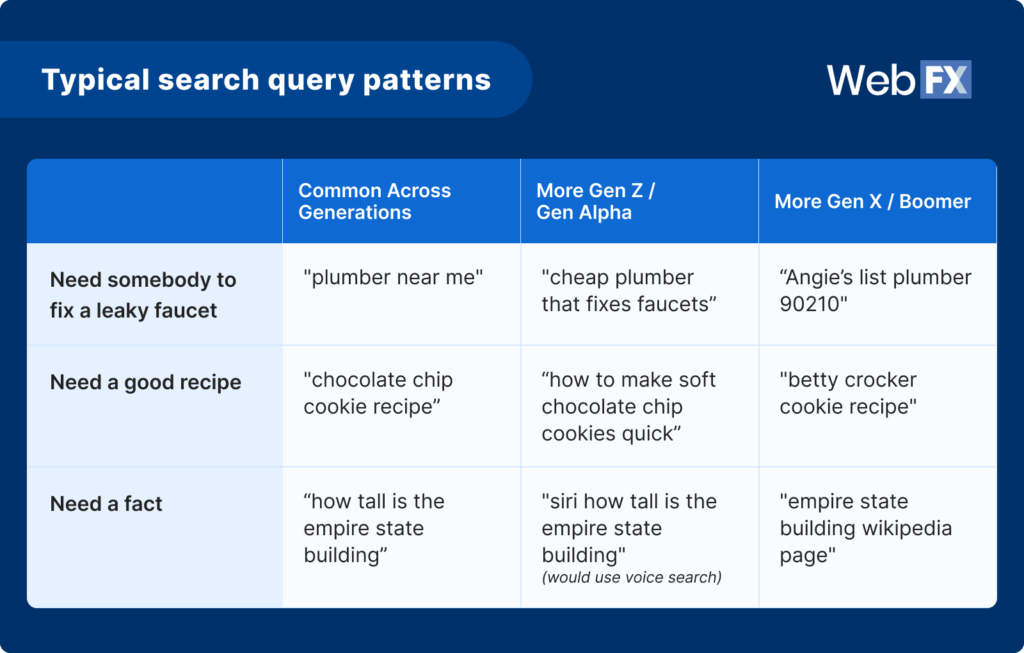
Gen Z
- Writes the longest queries (5.83 words on average) and most likely to use complete sentences
- Highest use of questions (43.57%) vs commands, showing a conversational approach to search
- Most often add quality-focused modifiers (like “best”) into search queries
- Lowest typo rate (0.07%) despite writing longer queries
Millennials
- Most likely to use polite language (1.79% of queries)
- High question mark usage (12.53%) but less than Gen Z
- Balanced use of different modifier types
- Most likely to use periods in queries (8.95%)
Gen X
- Highest rate of brand/platform mentions (5.16%)
- Most price-conscious in their searches (highest use of terms like “affordable,” “cheap,” “free”)
- Moderate use of location terms (15.19%)
- Shows clear transition between younger/older generational patterns
Boomers
- Most likely to use specific location terms (19.95%) and ZIP codes (1.91%)
- Highest rate of virtual assistant mentions (3.28%)
- Focus on professional credentials (“licensed,” “reliable”)
- Shortest queries (5.15 words) but highest typo rate (0.37%)
Evolving search trends
Let’s unpack all of this further, including some big trends we found that will change search in a big way over the coming years.
Younger generations search more conversationally than older generations
While the stereotype around younger generations may be that they speak informally (and have plenty of rizz), our data showed that they actually search more formally than older generations. Gen Z and Millennials tend to search conversationally – meaning they search how they talk.
They use longer search queries and will ask specific questions to a search engine, much like they would to another person.
| AVERAGE QUERY LENGTH (WORDS) | |
| Generation | Length |
| Gen Z | 5.83 |
| Millennials | 5.64 |
| Gen X | 5.54 |
| Boomers | 5.15 |
Older generations tend to search in almost a unique language that is geared towards generating results from search engines.
For example, a typical Gen Z search query about the weather might be “What’s the chance of rain today?” whereas a Gen X or Boomer query would be written specifically for search engines like “tampa fl weather”.
| QUESTIONS VS COMMANDS (% PHRASED AS QUESTIONS) | |
| Generation | Questions |
| Gen Z | 43.57% |
| Millennials | 33.76% |
| Gen X | 26.07% |
| Boomers | 23.22% |
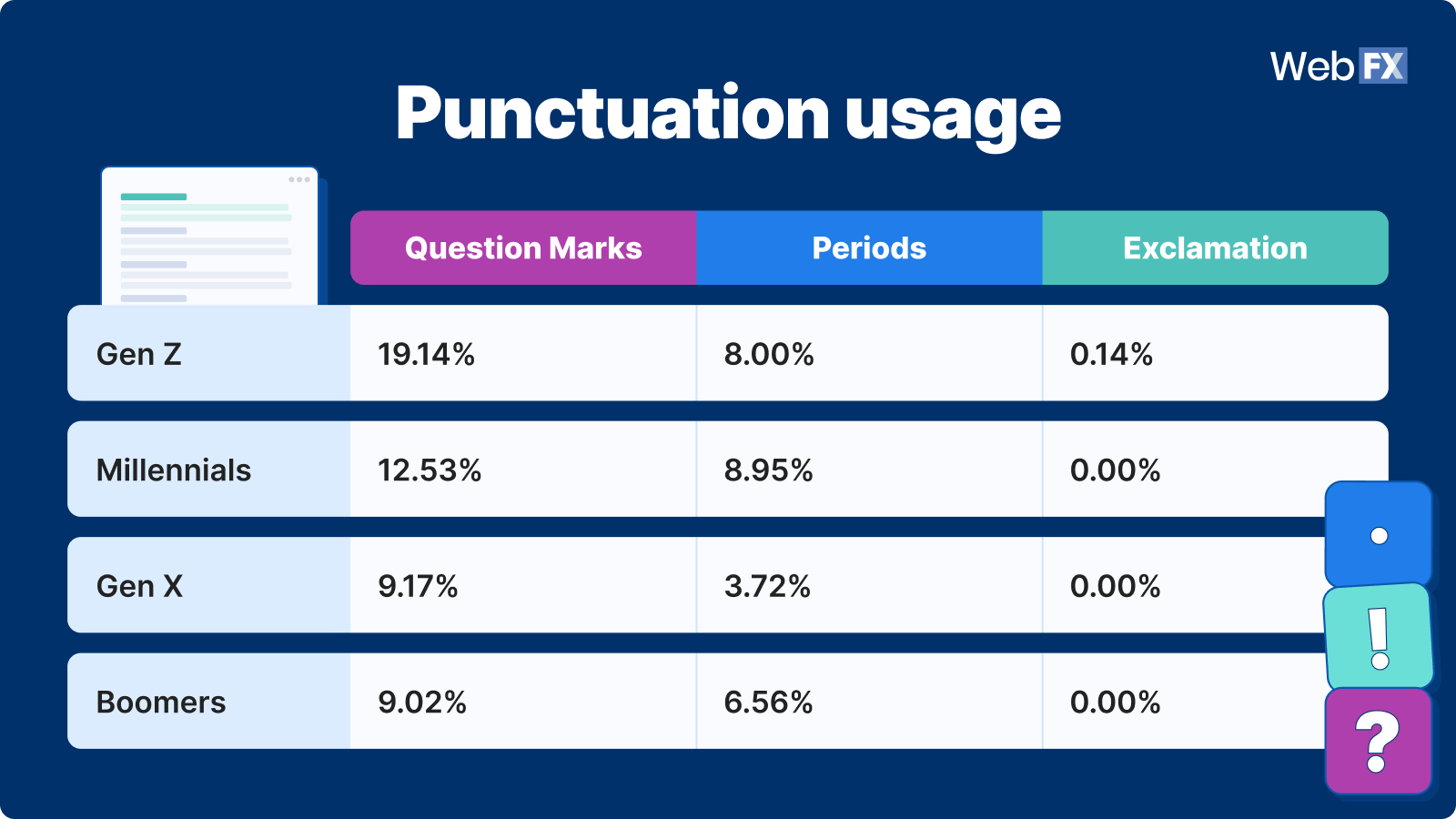
Let’s unpack these a little bit more!
Younger generations are more accustomed to relying on algorithms and AI to figure out what they are looking for in a question. If they ask about the high temperature, they expect search to be able to figure out their location and deliver a specific answer. Older generations feed more search engine information and then seek to find out the answer themselves.
A theory is that older generations (even older Millennials) who didn’t grow up with search learned to find info online using more rudimentary search engines where you need to add plenty of search operators to get quality answers returned.
Younger generations have not only grown up with Google at the center of the digital world, but they have grown up with smart speakers, Siri, and now LLMs where specific questions return a very direct answer.
As more consumers expect instant answers, this becomes a self-fulfilling prophecy where search products like Google have adapted to return more instant answers in things like AI Overviews, which then trains consumers to search for instant answers. So we may see big changes across even older generations in the coming years and new ways of instant answer delivery continue to gain prevalence.
If chat-based search becomes the go-to for informational retrieval, there are likely bigger changes to come in terms of how we think and our overall relationship with knowledge. Marshall McLuhan’s work on “the medium is the message” will have a fantastic case study in the future years with the rise of AI.
This poses a challenge for marketers to try and find more visibility for businesses in this new instant answer era. The rapid growth in AI search that is playing out is likely to grow as more consumers are used to searching in question and answer format.
Transactional query modifiers are rapidly evolving
An exciting finding in the data was the evolution of transactional and commercial search queries. These are the shorter tail, high volume keywords that are often extremely competitive in the SEO space. Our research used a variety of informational and transactional queries and separated the results.
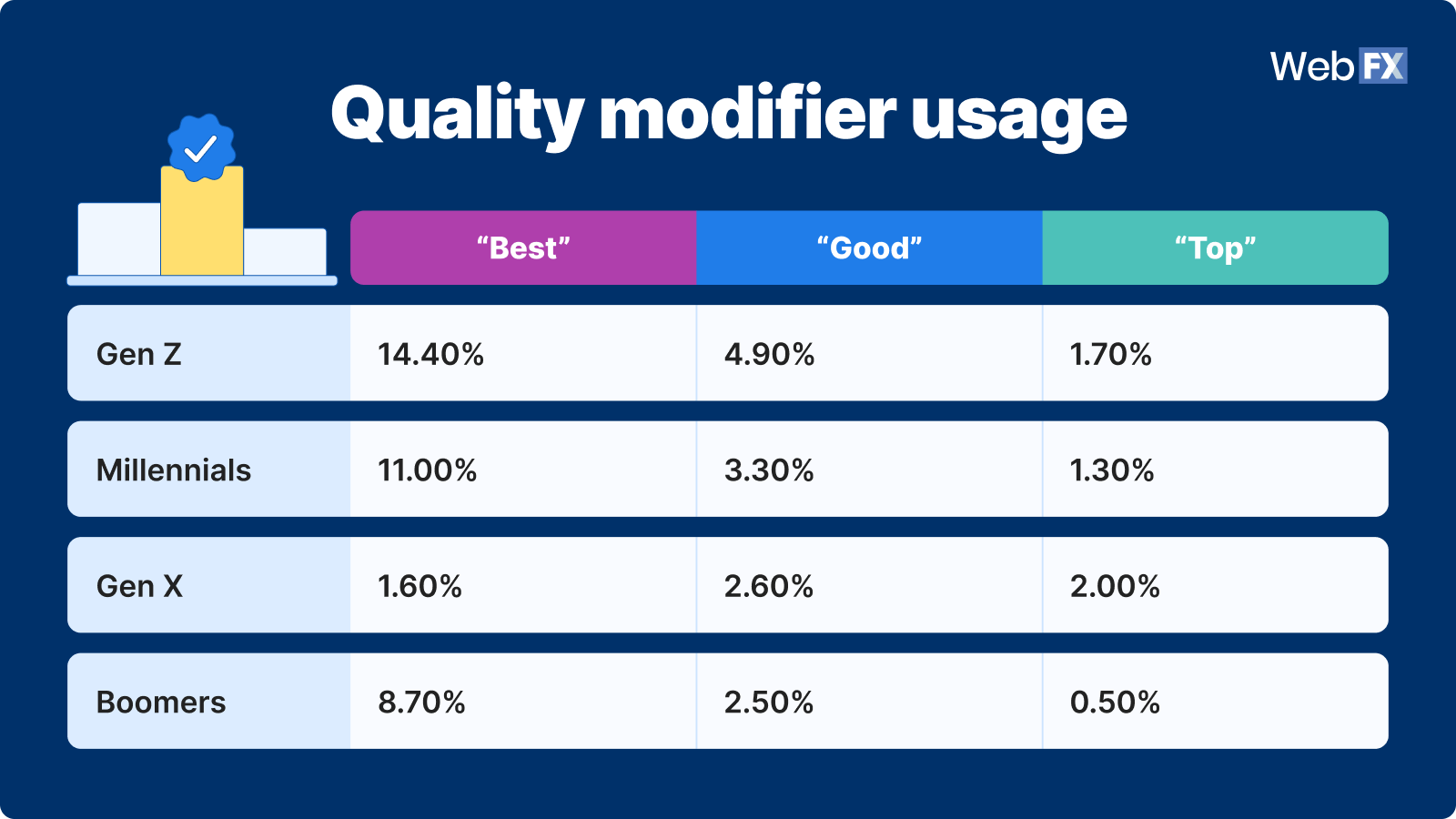
The pattern of conversational search carries over to transactional queries — younger generations are much more likely to add modifiers like “Best” or “Top” to a commercial query. So a Gen Z search for a local flower shop might be “best flower shop for roses” whereas a Gen X query would be a bit broader and less likely to use modifiers like “flower shops.”
One key modifier that is popular with older generations is location. Location matters much more to older generations, in particular Boomers. This is a key trust and selling point for them.
| LOCATION TERMS USAGE | |
| Generation | Usage |
| Boomers | 19.95% |
| Millennials | 15.35% |
| Gen X | 15.19% |
| Gen Z | 13.00% |
When other generations do use location modifiers, they do it in a different way than Boomers.
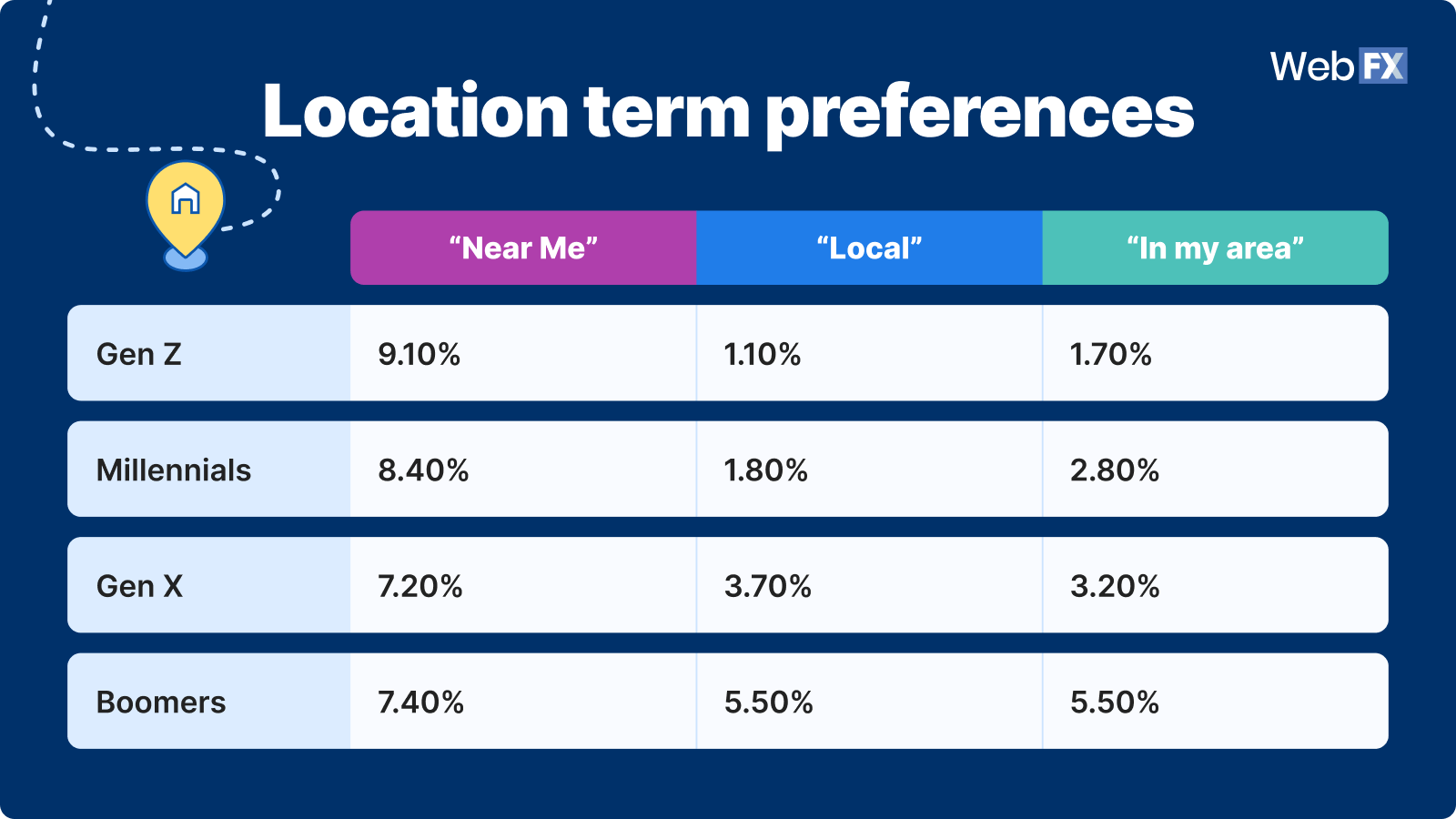
Younger generations tend to prefer “Near me” as a search query modifier, while older generations are more evenly split between “Near me,” “Local,” and “In my area”.
Zip code usage in search queries has evolved a lot too – Boomers are 14x more likely to include a zip code than Gen Z, who hardly uses them in search queries at all.
Overall, the younger generations prefer adding modifiers to commercial queries that focus on quality and speed – those are the two areas that matter most to them. Older generations tend to focus on location and reliability (we saw lots of queries referencing licensing and professional status, for example).
Everybody loves to search…and traditional search engines are still king (for now).
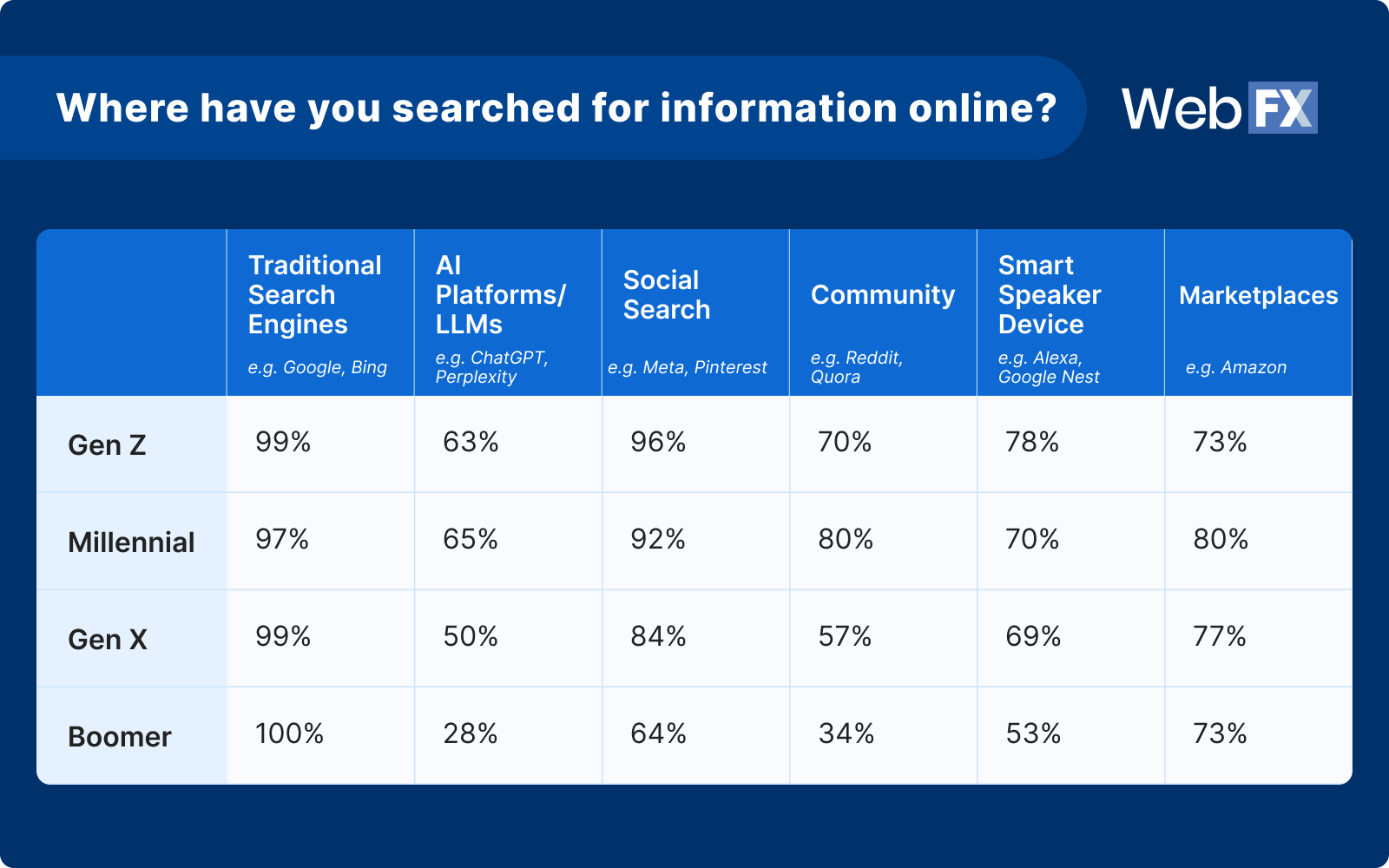
While how they search may be different, one of the big takeaways was that all generations have deeply embedded search into their daily lives.
In the thousands of queries we studied, there were only a handful of instances where our testers mentioned they wouldn’t search for something. All of those examples were from the Boomer generation, and they mentioned things like they’d prefer to look for a recipe in a cookbook or find a business recommendation from a friend.
What is starting to evolve a bit especially in the younger generations is where people search.
Gen Z and Millennials have similar patterns overall – they are much heavier users of AI platforms for search and also rely heavily on social platforms for search. For example, if they are looking for local events, they’ll go to Facebook to search instead of starting on Google like they may have in the past.
Another interesting outlier in the trends is the use of online communities like Reddit or Quora. These are especially popular among Millennials, who grew up with a web that was a bit more community focused vs. the more social, app driven web of today.
The data shows a propensity for younger generations to search in more areas online, in particular AI powered LLMs and directly within social media platforms.
The future of search
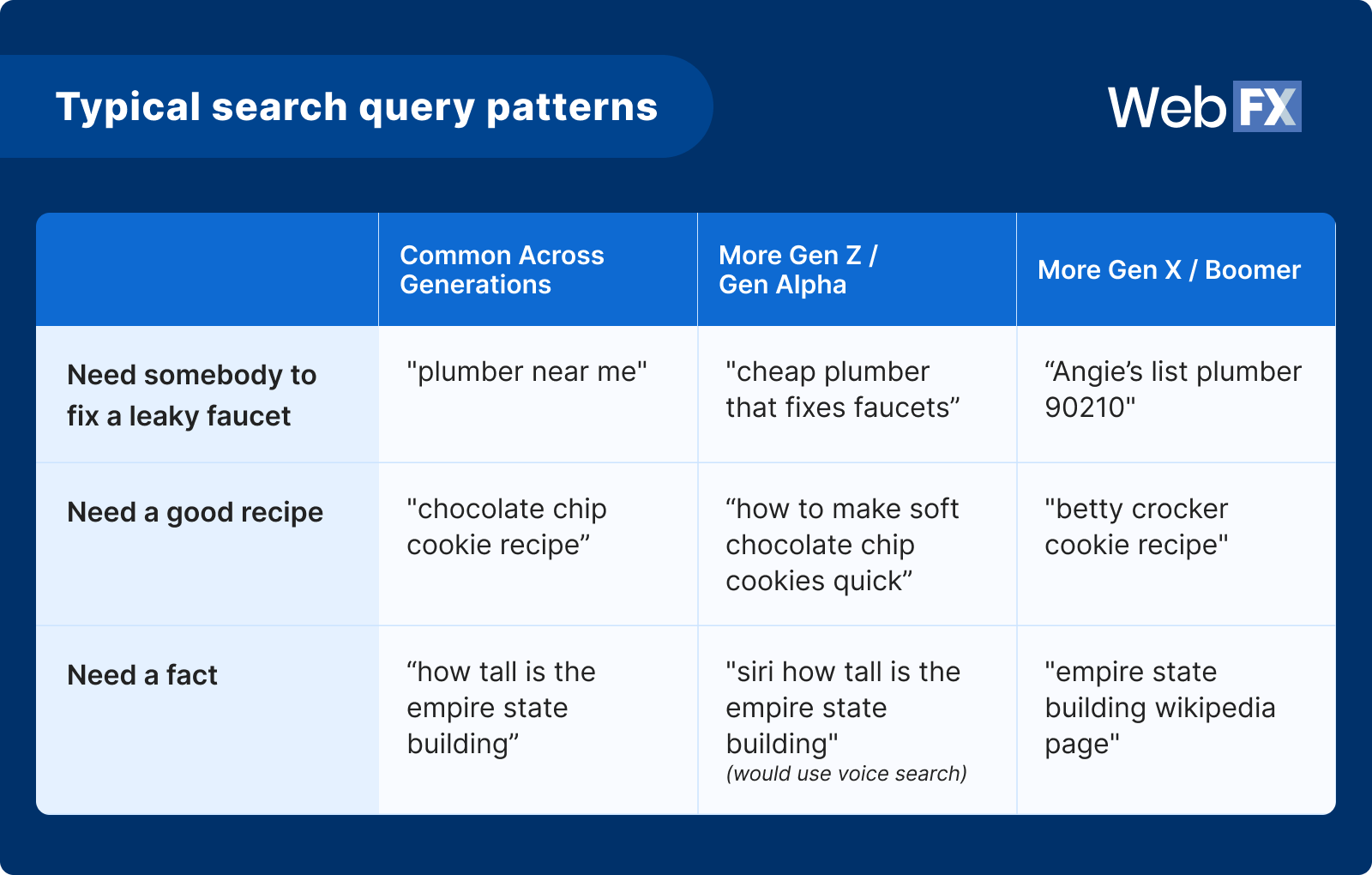
What these patterns suggest about the future of search is fascinating – and will shape digital commerce in the years to come. Gen Z’s approach – longer, more conversational queries with explicit quality modifiers and natural language questions – aligns perfectly with the capabilities of emerging AI-powered search systems.
Their tendency to:
- Write longer, more detailed queries
- Use natural language questions
- Focus on quality signals
- Assume context (like location awareness)
- Maintain high accuracy
These all suggest an intuitive understanding of how to effectively communicate with AI systems. As language models become more sophisticated and search engines more conversational, this approach is likely to become the norm rather than the exception.
The implications for search engine development and AI interaction design are significant. Rather than training users to adapt to keyword-based search patterns, future systems might be better served by embracing the more natural, conversational approach that younger users already employ.
For businesses and organizations looking to optimize their digital presence, here are a few things to keep in mind:
- Embrace conversational content that answers natural language questions.
- Think hard about your target market and identify where they are searching – don’t assume it’s only Google.
- Focus on quality signals in content and metadata. Answer specific questions with strong, detailed answers.
- Assume context awareness (especially with younger demographics) while maintaining explicit options for users who prefer to specify.
- Start to measure your visibility on emerging search platforms like ChatGPT, Perplexity and others.
The generational differences in search behavior reveal more than just varying comfort levels with technology — they show us the evolution of human-computer interaction.
As search engines continue to evolve toward more natural language processing and conversational AI, the “intuitive” approaches of younger users may well become the standard for effective information seeking.
Their longer, more natural queries and question-based approach might not just be a generational preference—it could be a preview of how we’ll all be interacting with search technology in the future.
Keep up with the future of search with WebFX
Want to stay in the loop with the latest search updates?
Follow the WebFX blog, and join 200,000 email subscribers and get the latest marketing news directly in your inbox!
-
 Trevin serves as the VP of Marketing at WebFX. He has worked on over 450 marketing campaigns and has been building websites for over 25 years. His work has been featured by Search Engine Land, USA Today, Fast Company and Inc. Read his review of working with WebFX for the last 15 years.
Trevin serves as the VP of Marketing at WebFX. He has worked on over 450 marketing campaigns and has been building websites for over 25 years. His work has been featured by Search Engine Land, USA Today, Fast Company and Inc. Read his review of working with WebFX for the last 15 years. -

WebFX is a full-service marketing agency with 1,100+ client reviews and a 4.9-star rating on Clutch! Find out how our expert team and revenue-accelerating tech can drive results for you! Learn more
Try our free Marketing Calculator
Craft a tailored online marketing strategy! Utilize our free Internet marketing calculator for a custom plan based on your location, reach, timeframe, and budget.
Plan Your Marketing Budget

SEO Success with KOA

Proven Marketing Strategies
Try our free Marketing Calculator
Craft a tailored online marketing strategy! Utilize our free Internet marketing calculator for a custom plan based on your location, reach, timeframe, and budget.
Plan Your Marketing Budget





